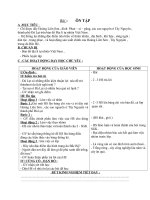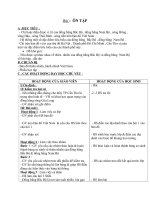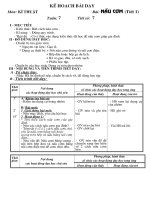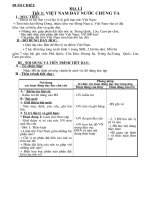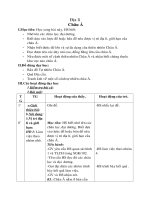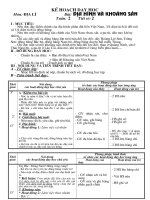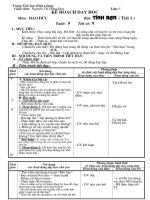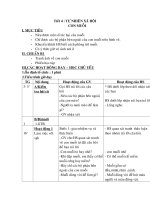unit 10 conservation tiếng anh 10 nguyễn thị bảy thư viện giáo án điện tử
Bạn đang xem bản rút gọn của tài liệu. Xem và tải ngay bản đầy đủ của tài liệu tại đây (210.22 KB, 25 trang )
<span class='text_page_counter'>(1)</span><div class='page_container' data-page=1>
<b>PASSIVE VOICE</b>
<b>Exercise 1: Choose the best answer by circling the corresponding letter A, B, C, or D </b>
1/ The manager insisted ……….me a position in the company.
A. for offering B. on offering C. in offer D. on offer
2/ The flight attendant reminded the man that smoking…there.
A. was not allowed B. is not allowed C. not to allow D. not allow
3/ The little boy begged the lady …………..some soup.
A. give B. gives C. giving D. to give
4/ They invited me ... the weekend with them.
A. spends B. spend C. to spend D. spending
5/ He reminded me ... the letter.
A. post B. to post C. posting D. to posting
6/ I warned Jim ... playing with the snakes.
A. for B. in C. of D. against
7/ Mary apologized for ... him earlier.
A. not phoning B. not phone C. not to phone D. not to phoning
8/ She advised him...harder.
A. to study B. to studying C. study D. studying
9/ My mother asked me ...the window.
A. open B. opening C. to opening D. to open
10/ Susan insisted on ... Mary to the beach.
A. drive B. driving C. to drive D. to driving
11/ Huong congratulated me on ... the entrance exam.
A. to pass B. to passing C. passing D. passed
12/ Mr Smith thanked Linda... inviting him to the party.
A. for B. of C. on D. to
13/ Mary refused ... me any more money.
A. to lend B. to lending C. lend D. lending
14/ The teacher told his students………all the homework before they ……….to class.
A. do/ come B. to do/ come C. to do/ came D. do/ came
15/ The supervisor apologized………
A. for be late B. for being late C. on being late D. on be late.
16/ The father told his son………..his time ………games all day.
A. not to waste/ play B. not to waste/playing C. not waste/play D.not waste/ playing
17/ The lecturer told the students not to hesitate to ask if they ……….a question.
A. have B. has C. to have D. had
18/ My mother advised me ………….hope.
A. not lose B. not to lose C. not losing D. not to losing
19/ She said she would visit me ……….
A. following day B. the next day C. tomorrow D. next day
20/ He said he……….. a busy day.
A. had had B. have had C. did have D. has had.
<b>Exercise 2: Choose the correct answer to complete the sentences.</b>
</div>
<span class='text_page_counter'>(2)</span><div class='page_container' data-page=2>
A. are discovered B. were discovering C. is discovered D. was discovere
2. Parrots and crows __________ The most intelligent birds.
A. were considering B. are considered C. Considered D. was considered
3. I still can’t believe! My bicycle __________ last night.
A. was stolen B. was stealing C. were stolen D. stole
4. Mary traffic accidents __________ by dangerous driving.
A. cause B. caused C. are caused D. which are caused.
5. Many US automobiles __________ in Detroit, Michigan.
A. manufacture B. are manufactured C. have manufactured D. are manufacturing
6. Grass __________ by fat cows on the green meadow
A. are eaten B. was being eaten C. were being eat D. was been eaten
7. So much progress __________ That there may be space-frights to Mars
A. is being made B. are being made C. will be made D. will being made
8. Many people believe we can look forward to the day when even our household jobs like cleaning and
decorating__________ by computer-control robots.
A. will be doing B. are being done C. would be done D. will be done.
9. English __________since 2002.
A. have been learned B. has been learnt C. has to learn D. have to learn
10. Your bill should __________ before you leave the hotel.
A. be paid B. is paid C. are paid D. was paid
<b>Exercise 3: Choose the underlined word or phrase or phrase in each sentence that need correcting.</b>
1. The new school will be open soon by the local government
A B C D
2. This machine have to be repaired
A B C D
3. Several people have been bitten on the dog
A B C D
4. A new hospital is being build in town
A B C D
5. The man were being questioned by the police then.
A B C D
<b>PASSIVE VOICE</b>
<b>Exercise 1: Change these sentences into Passive voice</b>
1 Tom delivers the mail every day ……….
2. Mr. John manages the export division………
3The teacher corrects our exercises………..
4.Somebody calls the president every day ………
5.Where do people speak English ? ……….
</div>
<span class='text_page_counter'>(3)</span><div class='page_container' data-page=3>
8. People speak English in almost every corner of the world ...
9. People spend a lot of money on advertising everyday ...
10. No one believes his story...
11 Fire destroyed that house ...
12.The students attended the lecture ...
13.The movie disappointed us very much ...
14.The police easily captured the thief ...
15.John returned the money last night ...
16. Smoke filled the room...
17. Bob took that book from the desk...
18.They started a dancing class last week...
19. Mr. Smith saw the accident...
20. The teacher returned our written work to us...
21.For the time being, Alice is teaching that group ...
22.John is calling the other members ...
23.The company is developing a new procedure ...
24.Who are they keeping in the kitchen?………
25.What books are people reading this year ?………
26. Nam is milking the cows. ………
27. My father is washing the car. ………
28. Sheila is drinking a cup of tea. ………
29. Mary is cutting the cake with sharp knife………...
30. The mailman is delivering the mail now………
31.Martha was delivering the documents to the department ...
32.A french architect was designing the palace………
33.Mr Brown was writing the report at 8 p.m yesterday………
34. Who was painting those windows.?………
35. The chef engineer was instructing all the workers of the plant………
36. They were not eating dinner. ………
37. We were painting the gate. ………
38. You were not driving him home. ………
39. He was feeding the dogs. ………
40. Was she reading these lines?.………
41. Beth has finished the report ...
42. Somebody has taken my briefcase ...
43. She has finished the report at noon ...
44. The police have arrested five suspects ...
45. Kerrie has paid the bill. ...
46. I have eaten a hamburger. ...
47. I have opened the present...
48. They have not read the book. ...
49. You have not sent the parcel. ...
50. Has she phoned ...
</div>
<span class='text_page_counter'>(4)</span><div class='page_container' data-page=4>
52. He had finished his home work before she came...
53. They had written the passage...
54. They had planted trees...
55. I know that they had told him of the meeting...
56. They had started a fight. ...
57. I had not closed the window. ...
58. They had not bought the paper. ...
59. Had she solved the problem? –...
60. John will receive the papers tomorrow...
61. Somebody will call Mr. Watson tonight ...
62. Barbara will eat the cake ...
63. They will build a new bridge near my house next year...
64. They will widen the road to our village...
65. They will hold the meeting before May Day...
66. Jane will buy a new computer. ...
67. Millions of people will visit the museum. ...
68. Our boss will sign the contract. ...
69.They will not ask him. ...
70. John is going to call the other members ...
71. The company is going to develop a new procedure ...
72. The students are going to plant trees here...
73. My mother is going to sell this house...
74. They are going to decorate the room next week...
75. She is going to tell a story...
76. The teacher is going to give a lesson...
77. They are going to buy a new car next month...
78.How can they open this safe?………
79.You ought to water these plants once a week.………
80.They may discuss the problems again………
</div>
<span class='text_page_counter'>(5)</span><div class='page_container' data-page=5>
<i><b>Exercise 2: Choose the underlined word or phrase in each sentence that need correcting.</b></i>
1. The new school will be open soon by the local government
A B C D
2. This machine have to be repaired
A B C D
3. Several people have been bitten on the dog
A B C D
4. A new hospital is being build in town
A B C D
5. The man were being questioned by the police then.
A B C D
<i><b>Exercise 3: Choose the sentence which is closest in meaning to the original one.</b></i>
6. They cancelled all flights because of fog.
A. All flights were because of fog were cancelled C. All flight were because of fog cancelled.
B. All flight were cancelled because of fog. D. All flights were cancelled by them of fog.
7. They had to postpone the meeting because of illness.
A. The meeting because of illness had to be postponed. B. The meeting had to because of illness be postponed.
C. The meeting had to postponed because of illness. D.The meeting had to be postponed because of illness
8. They are building a new highway around the city.
A.A new highway around the city is being built. C.A new highway is being built around the city.
B.A new highway is being built around the city by them. D. Around the city a new highway is being built.
9. They will ask you a lot of questions at the interview.
A. You will be asked a lot of questions at the interview
B. You will be asked a lot of questions at the interview by them.
C. A lot of questions will be asked you at the interview.
D. A lot of questions will be asked at the interview.
10. They have built a new hospital near the airport.
A.A new hospital near the airport has been built. C.A new hospital has been built near the airport.
B.A new hospital has been built near the airport by them. D. Near the airport a new hospital has been
11. My father gives me a new shirt.
A. A new shirt is given me by my father B. A new shirt is give me by my father.
C. A new shirt is given by me my father. D. A new shirt are given me by my father
12. A new hat is bought by Lan.
A. Lan buys a new hat. B. Lan buy a hat new.
C. Lan bought a new hat. D. Lan is bought a new hat.
13. People speak English everywhere.
A. English was spoken everywhere. B. English was speak
C. English is spoken everywhere. D. English is speaks everywhere.
14. They drink much wine.
A. Much wine are drunk by them. B. Much wine is drank by them.
C. Much wine is drunk by them. D. Much wine is drink by them.
15. They belived that he saved me
</div>
<span class='text_page_counter'>(6)</span><div class='page_container' data-page=6>
I. Đổi sang câu bị động
1. He always plays game after school.
2. My student visited her granny last week.
3. I seldom do the homework.
4. Do you enjoy this cake?
5. Did you change the rule?
6. Who bought this umbrella?
7. Which magazines do you prefer?
8. When did you enjoy this delicious cake?
9. Why didn’t you clean the house?
10. My sister gave you this pizza.
II. Đổi sang câu bị động.
1. My wife cleaned the floor and washed the dishes yesterday.
2. He opens the door and closes the door every day.
3. I got my husband to repair my bicycle.
4. I let my children go out.
5. Don’t open your book.
6. Will you finish her exam?
7. I made her finish her exam.
8. Did you change your password?
9. Have you finished the report?
10. Why did my student visit her granny last week?
III. Đổi sang câu chủ động
1. This pencil is used to draw by Nina.
</div>
<span class='text_page_counter'>(7)</span><div class='page_container' data-page=7>
3. My house had been painted before I travelled.
4. By whom was this house painted?
5. Will the ruler be bought by my mother tomorrow?
6. This pizza was given to you by my sister.
7. You were given this pizza by my sister.
8. I was let to go out.
9. The pictures have been finished by Nina.
10. Were these houses sold by my father?
IV. Đổi sang câu chủ động
1. My students were let to play game in the class.
2. The test was done by my students.
3. Where were baskets bought?
4. Can this radio be bought by her mother?
5. This cake was made to give my sister.
6. I had my pencil repaired yesterday.
7. It is difficult for information technology to be learned.
8. My room needs painting.
9. My room needs to be painted.
10. People say that he is good at English.
<b>THE KEY</b>
1. The mail is delivered every day by Tom.
2. The export division is managed by Mr. John.
3. Our exercises are corrected by the teacher.
4. The president is called every day by somebody
5. Where is English spoken ?
6. The riverbank is covered by weeds
7. Milk is used for making butter and cheese..
</div>
<span class='text_page_counter'>(8)</span><div class='page_container' data-page=8>
II.
11.That house was destroyed by fire
12.The lecture was attended by the students
13.We were disappointed by the movie very much.
14.The thief was captured by the police easily.
15.The money was returned by John last night
16. The room was filled with smoke.
17. That book was taken from the desk by Bob.
18. a dancing class was started last week by them.
19. the accident was seen by Mr.Smith
20. our written work was returned to us by the teacher
III.
21.For the time being, that group is being taught by Alice.
22.The other members is being called by John.
23.A new procedure is being developed by the company.
24.Who is being kept in the kitchen.
25.What books are people being read this year.
26. The cows are being milked by Nam
27. The car is being washed by my father
28. A cup of tea is being drunk by Sheila
29. The cake is being cut with sharp knife by Mary
30. The mail is being devivered by the mailman
IV.
31.The documents were being delivered to the department by Martha.
32.The palace was being designed by a french architect.
33.The report was being written at 8 p.m yesterday by Mr Brown.
34.Who were those windows being painted?
35. All the workers of the plant were being instructed by the chef engineer
36. Dinner was not being eaten by them
37. The gate was being painted by us
38. He was not being driven home by me
39. The dogs were being fed by him
40. Were these lines being read by her?
V.
41.The report has been finished by Beth.
42.My briefcase has been taken.
43.The report has been finished at noon.
44.Five suspects have been arrested by the police.
45. The bill has been paid by Kerrie
</div>
<span class='text_page_counter'>(9)</span><div class='page_container' data-page=9>
50. Has he been phoned by her?
VI.
51.The information had been received before the recess by the delegates.
52. His home work had been finished before she came.
53. The passage had been written.
54.Trees had been planted.
55. I know that he had been told of the meeting by them
56. A fight had been started by them
57. The window had not been closed.
58. The paper had not been bought by them.
59. Had the problem been solved by her?
VII.
60.The papers will be received tomorrow by John.
61.Mr Watson will be called tonight.
62.The cake will be eaten by Barbara.
63.A new bridge will be built near my house next year.
64.The road will be widened to our village.
65. The meeting will be held before May day by them
66. A new computer will be bought by Jane
67. The museum will be visited by million people
68. The contact will be signed by our boss
69 .He will not be asked by then
VIII.
70.The other members are going to be called by John.
71.A new procedure is going to be developed by the company.
72.Trees are going to be planted here.
73.This house is going to be sold by my mother.
74.The room is going to be decorated next week (by them)
75. A story is going to be told by her
76. A lesson is going to be given by the teacher
77. A new car is going to be bought by them next month.
78.How can this safe be opened?
79.These plants ought to be watered once a week.
80.The problems may be discussed again.
81.Matches should be placed out of reach of children.
82.Nothing can be gained without effort.
83.Natural resources must be conserved.
84.to be met
</div>
<span class='text_page_counter'>(10)</span><div class='page_container' data-page=10>
91.B 92.A 93.A 94.B 95.B
<b>Lưu ý: Ví trị của trạng từ và cụm trạng từ:</b>
- Thời gian: sau BY. Ví dụ: These pens have been bought by Nina for 2 hours.
- Ví trí: trước BY. Ví dụ: These pens have been bought at that shop by Nina.
Chúng ta cùng làm bài tập để hiểu thêm bài học ngày hôm nay.
<b>I. Chuyển sang câu bị động.</b>
1. Tom has seen this film before.
2. Nina has read the newspaper already.
3. They have seen these movies yet.
4. I have signed the contract.
5. These men have bought the tickets.
6. I have bought this teddy bear in that shop.
7. Vicky has found her hat.
8. I have lost my bag.
9. We have finished the report.
10. I have done my exercise for three days.
<b>II. Đổi sang câu chủ động.</b>
1. These newspapers have been bought by Nina.
2. These reports have been typed for 2 hours.
3. My dogs have been taken good care of by my father.
4. Computer science has been studied by my brother since June.
5. This movie hasn’t been seen by my mother.
6. This car has been bought by Nina.
7. The thief has been found by the police.
8. Her pens have been found.
9. The reports have been finished.
</div>
<span class='text_page_counter'>(11)</span><div class='page_container' data-page=11>
I. Câu bị động ở dạng Yes-No Question.
Yes-No Question là những câu hỏi mà câu trả lời phải là yes hay no và thường được bắt đầu bằng:
1. Các động từ khiếm khuyết: shall, ought to, must, will, would, might, may
2. Các trợ động từ: Do, Does, Did, Have, Be.
Nào, chúng ta cùng đi vào những ví dụ về cách chuyển đổi câu chủ động sang câu bị động ở dạng này nhé.
Ví dụ 1: Does your friend eat that chocolate cake? (câu chủ động)
Bước 1: Xác định thì của câu hỏi. Vì đây là thì hiện tại đơn nên ta dùng công thức bị động.
→ S + am/is/are+ V3/Ved.
Bước 2: Chúng ta cứ làm như một câu bị động ở thì hiện tại đơn bình thường, đừng quan tâm tới dấu chấm
hỏi:
<i> → That chocolate cake is eaten by your friend.</i>
Bước 3: lúc này, ta mới trả dấu chấm hỏi về, và chỉ việc đưa am/is/are lên đầu câu là xong.
→ Is that cake eaten by your friend?
Ví dụ 2: Did your mother tell this story?
Bước 1: Vì đây là thì quá khứ đơn nên ta dùng công thức bị động như sau: S + was/were + V3/ved.
Bước 2: Chúng ta che từ “Did” đi và làm như một câu bị động ở thì quá khứ đơn, ta có: This story was told by
<i>your mother.</i>
Bước 3: ta trả lại dấu chấm hỏi bằng cách đưa was hoặc were lên đầu câu, ta có: → Was this story told by
<i>your mother?</i>
II. Dạng câu bị động Wh- Question.
1. Dạng 1: When/why/how/where + Yes –No Question.
1.1. Where does your friend eat that chocolate cake?
Ta sẽ làm 3 bước tương tự như dạng Yes-No Question rồi cuối cùng thêm các từ When, why, how,
where là xong.
→ Where was that chocolate cake eaten by your friend?
2. Dạng 2: Câu bị động với Who + V + O
Các bạn nhìn vào ví dụ sau để biết cách chuyển đổi.
Ví dụ: Who made this cake?
</div>
<span class='text_page_counter'>(12)</span><div class='page_container' data-page=12>
Ví dụ: Which books does your sister read?
→ Which books are read by your sister?
Lưu ý: Vì does ở thì hiện tại đơn nên ta chia theo cơng thức bị động ở thì hiện tại đơn và are được chia phụ
thuộc vào từ books.
Ví dụ: What plays did Nam Cam write?
→ What plays were written by Nam Cao?
Lưu ý: Vì <i>did</i> ở thì quá khứ đơn nên ta chia theo công thức bị động ở thì quá khứ đơn và <i>were </i>được chia phụ
thuộc vào từ <i>plays</i>.
<b>Bài tập</b>
Đổi sang câu bị động các câu sau:
1. Does your brother find the key?
2. Do you sweep the floor?
</div>
<span class='text_page_counter'>(13)</span><div class='page_container' data-page=13>
19. When do they wash the dishes?
20. Why will your granny visit you next week?
1. Câu bị động đặc biệt dạng 1:
<i><b> </b></i>
<i><b> Cấu trúc: S + V1, V2 + O (Câu này có 2 động từ)</b></i>
Ví dụ:
- I typed the letters and mailed them this morning. (câu chủ động)
- Với câu này, 2 động từ là typed và mailed, và có cùng một túc từ là letters. Vì vậy ta có cách đổi câu bị động
như sau:
- Kết quả: The letters were typed and mailed this morning. (câu bị động)
2. Câu bị động đặc biệt dạng 2:
<i><b> Cấu trúc: S + V1, V2 + O1, O2 (câu này có 2 động từ, 2 túc từ)</b></i>
Ví dụ:
- I have done my homework and have typed the report. (câu chủ động)
- Trong câu này, 2 động từ là done và typed, 2 túc từ là my homework và the report. Với câu dạng 2 động từ
và 2 túc từ, ta có cách đổi như sau:
- My homework has been done and the report has been typed. (câu bị động)
3. Câu bị động đặc biệt dạng 3:
Cấu trúc: V + O + V Dùng cho MAKE hoặc LET
Ví dụ:
- He made us do this. (câu chủ động) = We were made to do this. (câu bị động)
They let him go (câu chủ động) = He was allowed to go = He was let to go.
- Lưu ý: Khi đổi sang câu bị động, từ “LET” nên được đổi thành “ALLOW”.
4. Bài tập:
1. I type the reports and send them every day.
A. The reports are typed and sent every day
B. The reports is typed and sent every day.
C. The reports are typed and send every day.
2. They let me do.
A. I were allowed do
B. I was allowed to do
C. I was allowed do
</div>
<span class='text_page_counter'>(14)</span><div class='page_container' data-page=14>
A. The floor has just been swept and the dishes have just been washed.
B. The floor and the dishes have just been swept and have just been washed.
C. A & B
4. I bought an English book and gave it to my friend.
A. An English book was bought and given to my friend.
B. An English book was bought and was given to my friend.
C. An English book was bought.
5. I made him do his homework.
A. He is made do his homework.
B. He was made to do his homework.
C. He was made do his homework.
6. I let my girlfriend choose her own ring.
A. She chooses her own ring.
B. My girlfriend was allowed to choose her own ring.
C. My girlfriend was let choose her own ring.
7. I made him come.
A. He was made to come.
B. He is made to come.
C. He made to come
8. My brother reads books and watches films every night.
A. Books are read and films are watched by my brother every night.
B. Books are read and films are watched every night by my brother.
C. A & B
</div>
<span class='text_page_counter'>(15)</span><div class='page_container' data-page=15>
B. Beautiful flowers was bought and given to me by the students.
C. Beautiful flowers are bought and given to me by the students.
10. I let her go.
A. She was let go.
B. She was let to go.
C. She is let to go.
1. Dạng 1: S + V + O + V
Và đây là ví dụ cho công thức trên:
I saw some people enter the block.
Với những câu ở dạng này, ta có cách đổi sang câu bị động như sau:
Some people were seen to enter the block.
2. Dạng 2: Khi một mệnh đề chứa that (có nghĩa là rằng) được dùng như là túc từ cho một trong số những động từ
sau:acknowledge (công nhận), assume (cho rằng), believe (tin), claim (yêu sách), consider (cân
<i>nhắc), estimate (ước tính), feel (cảm thấy), find (tìm thấy), report (báo </i>
<i>cáo), say (nói), think (nghĩ), understand (hiểu).</i>
Ví dụ: People say that he is jealous of her. (câu chủ động)
Ta có 2 cách đổi sang câu bị động.
Cách 1: It is said that he is jealous of her. (Với vế câu “It is said” được chia theo từ “say”. Vì “say” ở thì
hiện tại nên ta có “It is said”. Sau đó viết tất cả những gì sau “that” ra.
Cách 2: He is said to be jealous of her. (ta đưa chủ từ sau “that” lên và đó là từ “he”, “is said” được chia
theo từ “say” ở câu chủ động. Còn động từ thứ 2 sẽ được chuyển thành to v.
CHÚ Ý: Nhìn vào 2 ví dụ sau:
<b>I believed that he was innocent.</b> <b>I believe that he was innocent.</b>
Cách 1: It was believed that he was innocent. Cách 1: It is believed that he was innocent.
Cách 2: He was believed to be innocent. Cách 2: He is believed to have been innocent.
Nhìn vào 2 ví dụ trên, ta rút ra được như sau.
Ở ví dụ 1, ta thấy 2 động từ đều ở thì quá khứ hết believed và was hoặc đều hiện tại hết như believe và is thì ở
cách 2 ta phải chia là TO BE.
</div>
<span class='text_page_counter'>(16)</span><div class='page_container' data-page=16>
3. Bài tập:
Để giúp các bạn hiểu rõ hơn về 2 dạng này, các bạn hãy làm một số bài tập sau.
1. People think that he is very handsome.
A. He is thought that he was very handsome.
B. He is thought that he is vey handsome.
C. It is thought that he is very handsome.
2. They believe that he was intelligent.
A. He is believed to have been intelligent.
B. It is believed that he was intelligent.
C. A & B
3. We know that the teacher has bought a new house.
A. It is said that a new house has been bought by the teacher.
B. The teacher is known to have bought a new house.
C. It is known that the teacher had bought a new house.
4. I saw him ride a bike.
A. He was seen to ride a bike.
B. He was seen ride a bike.
C. He was seen riding a bike.
5. She hears me call my students bad names.
A. I am heard to call my students bad names.
B. I was heard to call my students bad names.
C. A & B
</div>
<span class='text_page_counter'>(17)</span><div class='page_container' data-page=17>
7. I watched her do exercise.
A. She was watched to do exercise.
B. She was watched do exercise.
C. A & B
8. We believe that he is a good person.
A. It is believe that he is a good person.
B. It is believed that he is a good person.
C. It was believed that he is a good person.
9. I saw her close the door.
A. She was seen closing the door.
B. She was seen to close the door.
C. I was seen her close the door.
10. They estimate 100 people were killed.
A. It is estimated that 100 people were killed.
B. 100 people are estimated to have been killed.
C. A & B
11. It is said that two students were sung this song.
A. Two students are said to have been sung this song.
B. People said that two students were sung this song.
C. People said that two students have been sung this song.
12. It was thought that he was a special person.
A. People think that he was a special person.
B. People thought that he was a special person.
C. He is thought to be a special person.
</div>
<span class='text_page_counter'>(18)</span><div class='page_container' data-page=18>
I want somebody to take photographs. (câu chủ động)
Với dạng câu này, câu bị động được làm như sau:
I want photographs to be taken. (câu bị động)
2. Dạng 2:
o <b>HAVE, GET: SAI BẢO, NHỜ.</b>
Have + Someone + V. They had me correct the exercise yesterday.
Get + Someone + to V. They got me to correct the exercise yesterday.
o <b>Câu bị động:</b>
Have + something + V3/Ved. They had the exercise corrected yesterday.
Get +something + V3/Ved. They had the exercise corrected yesterday.
2. Dạng 3: Don’t + V + O (câu chủ động) = don’t + let + O + be Ved/V3.
Ví dụ:
1. Don’t open the door (câu chủ động) = don’t let the door be opened.
Chúng ta cùng vào làm bài tập nha
<b>1. He likes people to call him “sir”. </b>
o A. He likes to be called “sir”.
o B. He likes calling “sir”.
o C. He likes to be called him “sir”.
<b>2. He didn’t request the police to find his car.</b>
o A. He didn’t request his car to be found by the police.
o B. He didn’t hope to find his car.
o C. A&B
<b>3. I had her sweep the floor yesterday.</b>
o A. I had the floor sweep yesterday.
o B. The floor had swept yesterday.
o C. I had the floor swept yesterday.
<b>4. I got her to sweep the floor yesterday.</b>
o A. I got the floor sweep yesterday.
o B. I got the floor swept yesterday.
o C. A&B
<b>5. Don’t open your book.</b>
o A. Don’t let your book be opened.
o B. Don’t let the book open.
o C. I don’t open the book.
<b>6. Don’t do exercise.</b>
o A. I hate exercise.
o B. Don’t let exercise be done.
o C. A&B
</div>
<span class='text_page_counter'>(19)</span><div class='page_container' data-page=19>
o A. I persuaded the car to be repaired.
o B. I should persuade everyone to repair the car.
o C. The car should be repaired.
<b>8. I got him to do exercise yesterday.</b>
o A. I got exercise do yesterday.
o B. I got exercise done yesterday.
o C. A&B
<b>9. I had her do exercise yesterday. </b>
o A. I had exercise done yesterday.
o B. I had exercise doing.
o C. I have exercise yesterday.
<b>10. He didn’t expect her to do his housework. </b>
o A. She didn’t expect him do his exercise.
o B. He has his homework.
o C. He didn’t expect his homework to be done.
I. Đổi sang câu bị động
1. Did your friend mail that letter?
2. Has Nina finished the work?
3. Did he speak about tropical countries in the world?
4. Had your sister cleaned the floor when I came?
5. Does he make bad chocolate cake?
6. Must you post this letter?
7. Have you taken my book?
8. Can you clean the house?
9. Does he steal my ruler?
10. Does your friend buy this house?
II. Đổi sang câu bị động
1. Where do you find the box?
2. Who wrote this report?
</div>
<span class='text_page_counter'>(20)</span><div class='page_container' data-page=20>
4. Why do you clean the house?
5. Which books do you prefer?
6. Who did the homework?
7. When did Sam repair my car?
8. When did you steal my pencil case?
9. Who finished the report?
10. When did your mother mail that letter?
III. Đổi sang câu bị động
1. I clean the floor every day.
2. He saw a lion at the circus last week.
3. Sam and Nina told me this story.
4. I opened the door.
5. Your children ate this cake.
6. I have finished the report.
7. They had looked after this child when I came.
8. My father made this decision.
9. No one can do it.
10. Someone must send this report.
IV. Đổi sang câu chủ động
1. That movie has never seen by my father.
2. The book has not been finished.
3. Has snake meat been eaten by Nina?
4. The department was being cleaned by Sam when you called.
5. While the report was being written by Nina, Tom was looking for the key.
6. A present was sent to her.
</div>
<span class='text_page_counter'>(21)</span><div class='page_container' data-page=21>
8. The letter is typed by my sister everyday.
9. Is the key found by your mother?
10. Where is the key found by your mother?
<b>I. Bị Động Của Thì </b>
Eg: - Marry redecorated the living room yesterday.
...
- The police have caught two wanted murders.
...
- You should make tea with hot water.
...
Note:
<b>-</b> Các chủ ngữ I, we, you, they, he, she, one, everyone, no one, people… trong câu chủ động thường được
bỏ đi trong câu bị động.
Eg: - No one swept this street yesterday.
<b> ...</b>
<i><b>-</b></i> <i><b>Trạng từ chỉ nơi chốn + By O + Trạng từ chỉ thời gian</b></i>
Eg: Marry put the vase of flowers on the table yesterday.
...
<b>-</b> <b>Trạng từ thể cách (trạng từ) đứng giữa “BE” và “V3/ed”</b>
Eg: Scientists have studied this problem carefully.
...
<b>* Cách chuyển đổi bị động của câu hỏi Yes/No-question và câu hỏi Wh-question:</b>
<b>Câu hỏi Yes/No-question</b>
Eg: Did Mary buy this beautiful dress?
<b>-</b> Xác định thì: QKĐ
<b>-</b> Chuyển câu gốc thành câu khẳng định (S + V + O)
<b>-</b> <sub></sub> Marry bought this beautiful dress.
<b>-</b> Đổi câu khẳng định mới vừa chuyển thành câu bị động theo thì
<b>-</b> <sub></sub> This beautiful dress was bought by Marry.
<b>-</b> Từ câu bị động mới vừa chuyển <sub></sub> câu hỏi
Was this beautiful dress bought by Marry?
Eg: Have the thieves stolen the most valuable painting in the national museum?
...
<b>-</b> Are you going to repair those shoes?
</div>
<span class='text_page_counter'>(22)</span><div class='page_container' data-page=22>
<b>Câu hỏi Wh-question</b>
Eg: When did your father buy a new computer?
<b>-</b> Xác định thì: QKĐ
<b>-</b> Chuyển câu gốc thành câu khẳng định (S - V - O)
<b>-</b> <sub></sub> Your father bought a new computer.
<b>-</b> Đổi câu khẳng định mới vừa chuyển thành câu bị động theo thì
<b>-</b> <sub></sub> A new computer was bought by your father.
<b>-</b> Từ câu bị động mới vừa chuyển <sub></sub> câu hỏi đảo ngữ (V – S – O)
was a new computer bought by your father?
<b>-</b> <b>Ghi lại từ để hỏi (wh-) vào câu vừa đổi</b>
<b> When was a new computer bought by your father?</b>
<b>-</b> Why do people speak English all over the world?
...
<b>II.Bị Động của câu có 2 túc từ</b>
<i><b>People say/said that + S + V + O (chủ động)</b></i>
<i><b>It is/was said that + S + V + O to + V-inf + O (cùng thì) </b></i>
<i><b>S + am/is/are/was/were + said + to have + V(3/ed) + O (khác thì)</b></i>
<i>Eg: They said that he was a kind doctor.</i>
<i><b> ...</b></i>
<i><b> ...</b></i>
Note: Các động từ được dùng như say/said: know, think, believe, rumour, hope, expect, suppose …
Eg: - People believe (that) he was a thief.
...
...
* Cùng thì: HT – HT/ QK –QK/ HT – TL
* Khác thì: HT – QK/ QK – HT/ QK – TL
<b>III.</b> <b>Bị Động Của Động Từ Có Hai Tân Ngữ (Verb of two objects)</b>
<i>1.</i> Loại động từ cần có giới từ “TO”: send, show, lend, promise, hand, pay, read, throw, wish, offer.
Eg: Harry gave me a new watch yesterday = ...
...
...
<i>2.</i> Loại động từ cần có giới từ “FOR”: buy, get, make, do, save…
<i><b>Give</b></i><b> s.o s.th = </b><i><b>Give</b></i><b> s.th </b><i><b>To</b></i><b> s.o</b>
<b>Tặng cho ai cái gì = Tặng cái gì cho ai</b>
</div>
<span class='text_page_counter'>(23)</span><div class='page_container' data-page=23>
Eg: Susan bought an English book for Tom = ...
...
...
<b>IV.</b> <b>Bị Động Thể Nhờ Vả</b>
Eg:
<b>-</b> I had my assistant type the report.
<b>I had the report typed by my assistant.</b>
<b>-</b> I will have my lawyer look into it.
<b>I will have it looked into by my laywer.</b>
<b>-</b> Peter got a technician to repair his television.
<b>Peter got his television reapaired by a technician.</b>
* Lưu ý: Hai công thức bị động thể nhờ vả trên còn được dùng trong trường hợp diễn tả sự việc diễn ra không
tốt đẹp.
Eg: - John had all his money stolen from his hotel bedroom.
<b>-</b> I had my house destroyed by tornado yesterday.
<b>-</b> We got our car damaged by a falling tree.
<b>-</b> I got my nose broken by playing rugby.
<b>V.</b> <b>Bị Động Với Động Từ “Make” và “Let”</b>
Eg:
<b>-</b> The manager made all the employees work over the night at the weekend.
<b>All the employees were made to work over the night by the manager at the weekend.</b>
<b>-</b> She lets her son play computer game on Sunday afternoon.
<b>Her son is allowed to play computer game on Sunday afternoon.</b>
<b>VI.</b> <b>Bị động theo sau là To V-inf (hope/warn...) hoặc V-ing (like/star/begin...)</b>
<i><b>Active</b></i> <i><b>Passive</b></i>
<b>Verb + to V-inf</b> <b>Verb + to be + V-3/ed</b>
<b>Verb + V-ing</b> <b>Verb + being + V-3/ed</b>
<b>Verb + to have + V-3/ed</b> <b>Verb + to have been + V-3/ed</b>
<b>Verb + having + V-3/ed</b> <b>Verb + having been + V-3/ed</b>
Eg:
<b>Have </b><i><b>s.o</b></i><b> do </b><i><b>s.th</b></i><b> (nhờ ai đó làm gì)</b>
<b>Have s.th done by </b><i><b>s.o</b></i>
<b>Get </b><i><b>s.o</b></i><b> to do </b><i><b>s.th</b></i><b> (nhờ ai đó làm gì)</b>
<b>Make </b>
<i><b>s.o </b></i>
<b>do </b>
<i><b>s.th </b></i>
<b>(buộc ai đó làm gì)</b>
<i><b>s.o </b></i>
<b>be made to do</b>
<i><b> s.th</b></i>
</div>
<span class='text_page_counter'>(24)</span><div class='page_container' data-page=24>
<b>-</b> I wanted them to tell the story again.
<b>I wanted the story to be told again by them.</b>
<b>-</b> She canceled her calls because she avoided being disturbed.
<b>-</b> She forgot having been given a big sum of money that day.
<b>-</b> I want these dishes to have been washed when I come back.
<b>-</b> He dislikes ...what to do. (dislike/like + V-ing)
A. people tell him B. being told C. to be told D. they telling him
<b>VII.</b> <b>Bị động với động từ chỉ giác quan</b>
Các động từ chỉ giác quan: see, watch, hear, smell, taste....
<i><b>Active</b></i> <i><b>Passive</b></i>
<b>Verb + O + V-inf</b> <b>O + be + V-3/ed + to V-inf</b>
<b>Verb + O + V-ing</b> <b>O + be + V-3/ed + V-ing</b>
Eg: - They saw the man run away. <sub></sub> The man was seen to run away.
<b>-</b> They saw the man running away. <sub></sub> The man was seen running away.
<b>VIII. Bị động với động từ “NEED”</b>
<i><b>Active (chủ động)</b></i> <i><b>Passive</b></i>
<b>Need + to V-inf</b> <b>Need + to be + V-3/ed</b>
<b>Need + V-ing</b>
Eg: - You need to water flowers.
Flowers need watering/to be watered.
...
<b>-</b> Marry needs to paint her house.
<b>Marry’s house needs painting/to be painted.</b>
...
<b>IX.</b> <b>Bị động với các động từ sau:</b>
<b>S1 + Advise/Suggest/Recommend... that + S2 +should + V-inf + O (active)</b>
<b>S1 + Advise/Suggest/Recommend... that + S2 + should + be + V-3/ed + O (passive)</b>
Eg: - They recommended that a hotel ... on the edge of the lake.
A. should be built B. must be built C. was built D. could build
<b>X.</b> <b>Bị Động Với Câu Hỏi Đuôi (Tag Question)</b>
<b>Eg: - David broke the windows yesterday, didn’t he?</b>
<b>The windows were broken by David yesterday, were not/weren’t they?</b>
<b>-</b> <b>Marry put the vase of flowers on the table yesterday, didn’t she?</b>
<b>The vase of flowers was put on the table by Marry yesterday, wasn’t it?</b>
<b>XI.</b> <b>Bị Động Với Công Thức</b>
<i><b>It is/was + Adj (important / necessary /impossible...) + to Inf + O</b></i>
<i><b>It is/was + Adj (important/ necessary / impossible...) + for +O + to be + V3/ed</b></i>
<b>Eg: - It is very necessary to solve this problem. </b>
<b>It is very necessary for this problem to be solved. </b>
<b>-</b> It is impossible to mix two this components.
</div>
<span class='text_page_counter'>(25)</span><div class='page_container' data-page=25></div>
<!--links-->
